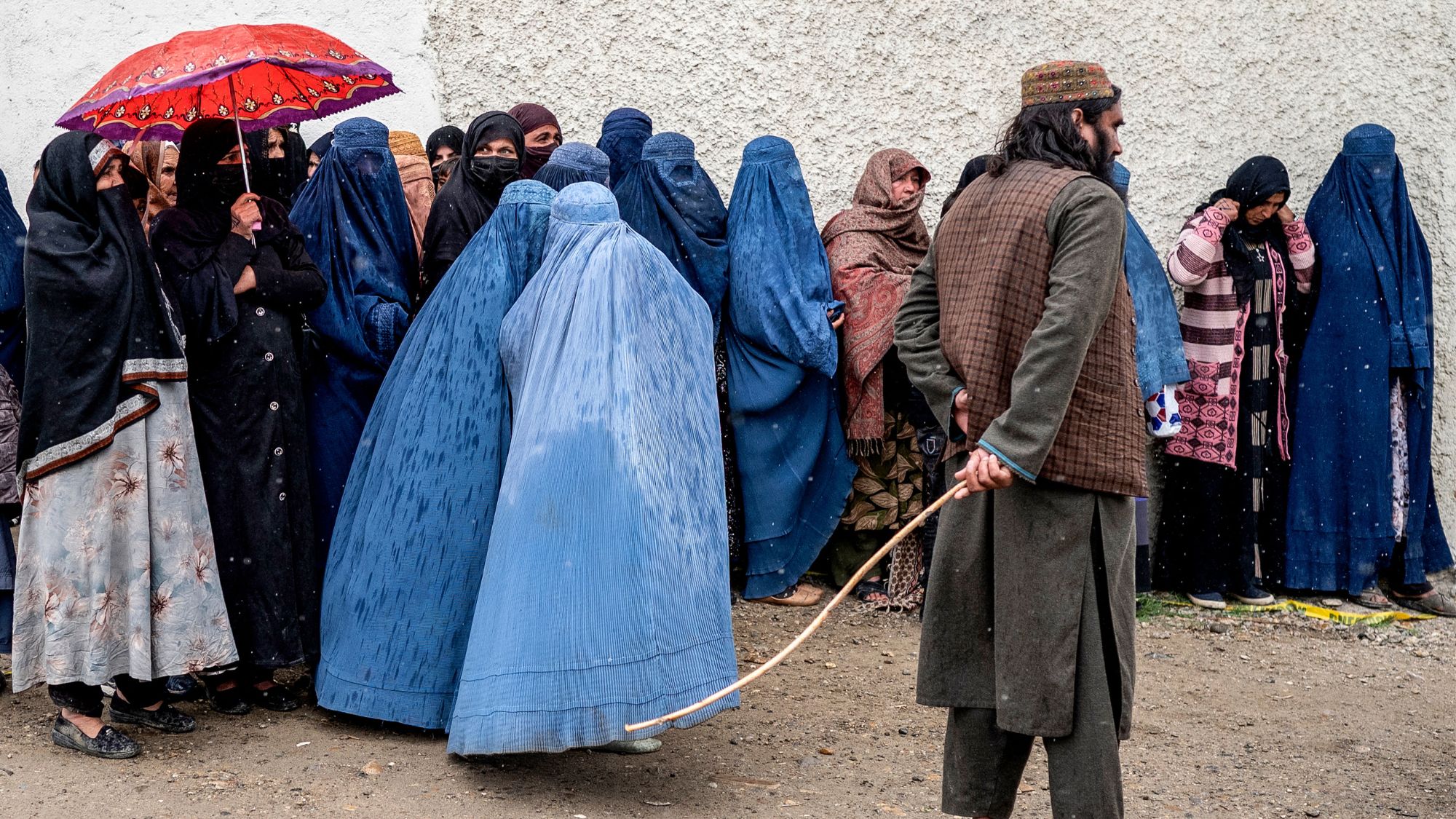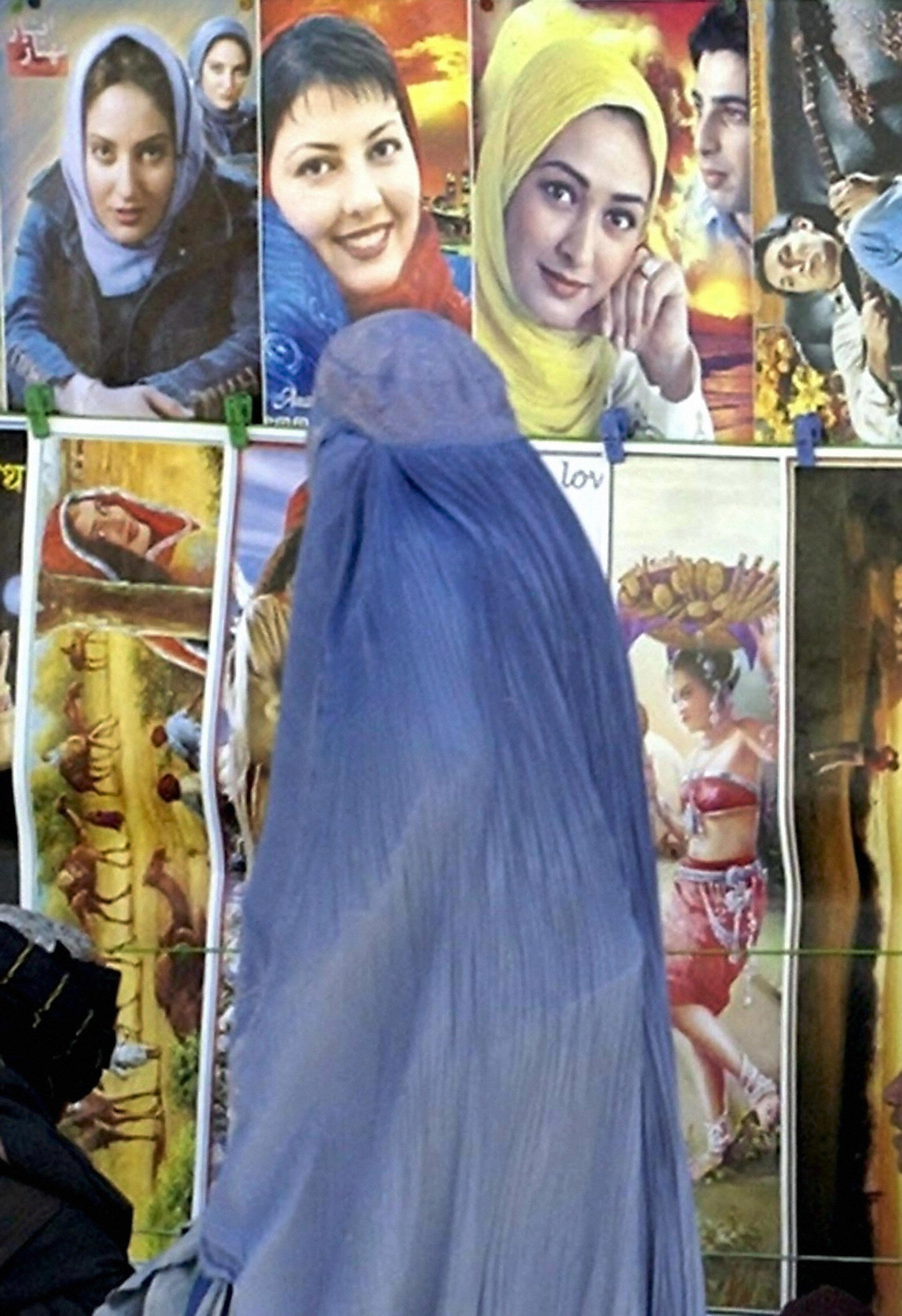Afghan Women Are Vanishing in Taliban’s Blackout
As the Taliban tightens its restraints on Afghanistan’s digital infrastructure, Afghan women are being left to disappear in the dark.


Celebrity news, beauty, fashion advice, and fascinating features, delivered straight to your inbox!
You are now subscribed
Your newsletter sign-up was successful
When the Taliban stormed back into power in August 2021, the world watched in horror as the regime instantly began erasing rights. Now, following a “total internet blackout,” according to NetBlocks, an internet watchdog, fears are mounting that the erasure is nearly complete.
Since 2021, Afghan women have been systematically stripped of their rights, voices, and visibility; the latter now extends to the entire country which, on Tuesday, 30th September, was plunged into digital darkness. Women—already silenced on the streets and within the confines of their own homes (under the Taliban’s “vice and virtue” laws, women are forbidden from speaking loudly inside their homes so their voices aren’t heard outside)—are now separated from the signals that allowed them a small connection to life beyond their borders.
“The human cost is devastating,” says Kathryn Allan, a spokesperson for Amnesty Feminist Network, who is calling on the international community to hold the Taliban accountable for human rights violations, recognise gender apartheid as a crime against humanity and investigate and prosecute accordingly. Co-chair Jessica Fortune adds: “But here’s what gives us hope: Afghan women refuse to be silenced. Both inside Afghanistan and in the diaspora, they continue to resist with extraordinary courage.”

An Afghan woman walks in front of posters on a roadside shop in Kandahar, 2005, ahead of the country's parliamentary elections. Since 2021, under Taliban rule, images of women have been systematically removed from public spaces—banned from billboards, advertisements, and media—part of a broader campaign to erase their presence from Afghan society entirely.
As part of Refugee Week 2025 , the International Rescue Committee shared the accounts of three women who fled Afghanistan following the fall of Kabul about the reality of living under Taliban rule and how they are rebuilding their lives in the UK.
Masoma’s life changed forever in August 2021. She’d been working with the British Council in Kabul, which meant her life—and the lives of her family—were in immediate danger. Her work made her eligible for a government scheme for Afghans who worked alongside Britain. But on the day she was due to flee for the UK, Masoma was caught in an explosion at Kabul airport and became separated from her father and brother in the chaos. The airport closure meant she had to remain in Afghanistan, living in hiding for almost three months before finally making her escape in November 2021.
Despite government promises that her family could join her, they remain separated by thousands of miles and are now not only at risk in Afghanistan, but cut off entirely. “It is difficult to put into words,” Masoma says, describing the separation from her loved ones. “They are my pulse, the very rhythm of my existence.”
Afghanistan has now lost four years of women university graduates — an entire generation of doctors, engineers, teachers, and leaders simply erased.
Kathryn Allan, Amnesty Feminist Network
When contact with the outside world is severed, so too is the lifeline for Afghan women who rely on remote education, mentorship, and mental health support from abroad. Homeschooling initiatives like Daricha, where Maryam, who also fled Afghanistan, now volunteers, are being strangled by the Taliban’s vice-like grip on the country.
Celebrity news, beauty, fashion advice, and fascinating features, delivered straight to your inbox!
Daricha offers online training and mentorship to Afghan women who have been banned from formal education. “We are working to provide training and mentoring for architecture and urban design students…female students who were denied the right to education after the changes in Afghanistan,” explains 27-year-old Maryam. She had followed in her father’s footsteps and became an architect after university, but when the Taliban took power, everything changed. She initially stayed in Kabul for eight months, but as the walls closed in—around classrooms, jobs, and women’s basic freedoms—Maryam left everything behind, including her family, to continue her studies abroad. She first moved to Kazakhstan, and then, six months later, secured a scholarship to study urban planning in London and travelled to the UK on her own.
A post shared by Amnesty UK Feminists (@amnestyfeminist)
A photo posted by on
Like Masoma, Maryam is now part of the International Rescue Committee’s Community Advisory Board, helping refugees in the UK as well as women back home in Afghanistan—though ongoing digital blackouts will surely make that connection impossible. Alone, displaced, and traumatised, Maryam has found refuge in painting. “Art has been like a free therapy for me,” she says. “I couldn’t focus, I couldn’t do something useful… but after I started expressing my feelings through art, it gave me a break from reality.” But back home, for millions of women like Maryam’s former classmates and colleagues, reality is no longer just oppressive, it’s vanishing.
The Taliban knows that the internet poses a threat to their control. Through digital platforms, Afghan women have found ways to resist, organise, learn, and be seen. Now, those fragile gains are being erased. Without access to online education or remote mentorship, young women in Afghanistan—already barred from school—are being erased from global knowledge networks. Without the ability to communicate safely, they can’t ask for help, report abuse, or access mental health support.
Women like Maryam and Masoma have been able to begin the painful process of rebuilding their lives outside of Afghanistan, but their stories, shared by IRC on Refugee Day, reveal what’s at stake if the world looks away while Afghan women who weren’t able to flee are forced to disappear in the dark.

Mischa Anouk Smith is the News and Features Editor of Marie Claire UK.
From personal essays to purpose-driven stories, reported studies, and interviews with celebrities like Rosie Huntington-Whiteley and designers including Dries Van Noten, Mischa has been featured in publications such as Refinery29, Stylist and Dazed. Her work explores what it means to be a woman today and sits at the intersection of culture and style. In the spirit of eclecticism, she has also written about NFTs, mental health and the rise of AI bands.